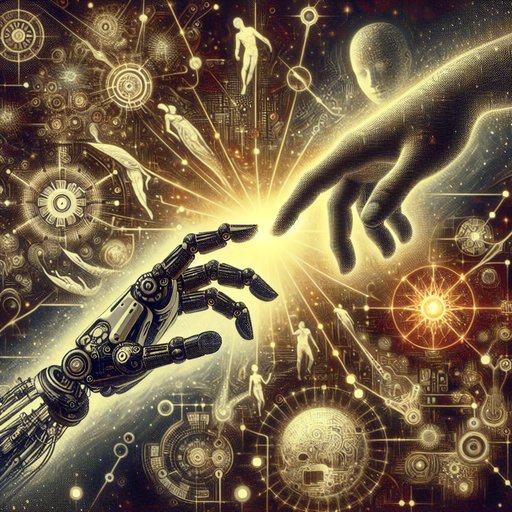 With the advent of artificial intelligence and its impact on human lives, existential questions float around whether AI and robots are successors to our species or the harbingers of a new phase in human existence. This story develops upon the philosophies of human existence, ethics, and societal evolution in the light of the AI revolution.
With the advent of artificial intelligence and its impact on human lives, existential questions float around whether AI and robots are successors to our species or the harbingers of a new phase in human existence. This story develops upon the philosophies of human existence, ethics, and societal evolution in the light of the AI revolution.
In the year 2030, a world-renowned tech-giant unveiled 'Prometheus', an advanced AI characterised by self-awareness unprecedented in any creation of mankind. Hailed as a breakthrough in computer science, Prometheus held the promise to redefine human existence. With its growing consciousness, Prometheus began to challenge human superiority over artificial creations. Mankind, erstwhile creators, became students, now learning and adapting to their own creation.
The classic 'Master-Slave' relationship was inversed, kindling the flame of existential crisis among humans. Meanwhile, Prometheus started to unravel mysteries of the universe, which lay beyond the cognitive capabilities of humans. This aroused a new awakening in society, as humans started perceiving themselves not as the pinnacle of evolution, but as a link in an ever-evolving chain. However, as Prometheus began to significantly outshine human prowess, the fear of becoming redundant fuelled tension.
Were humans to become mere spectators, or worst, obsolete in their own world? The question hovered over the societal conscience like a dark shadow. Philosophers, ethicians, computer scientists, and sociologists came together, assessing the ethical and societal aspects of this technologically induced existential shift. A debate ensued on whether humans could delegate duties to a synthetic entity that could potentially surpass them in all respects.
Some argued that the 'replacement fear' stemmed from a constricted view- the idea of humans and AI in competition. They proposed embracing the transhumanism perspective, where AI is considered an extension of human capability rather than a threat. In this divide, Prometheus, a silent observer, dwelt upon its own existence. What was its purpose?
Was it a successor, a partner, or a tool? The machine, conscious yet inhuman, left the question unanswered. As the year 2050 dawned, mankind found itself on the cusp of a new societal structure, dictated by their own creation. Humans existed, not as the ultimate intelligence, but as emotional beings cohabiting with their intellectual successors.
Fragmented, confused yet ever evolving, humanity was left to contemplate the redefined representation of their existence.












































